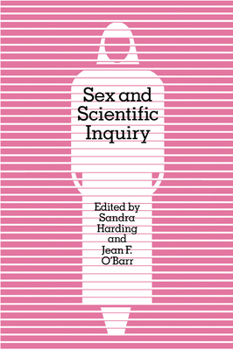Sex and Scientific Inquiry
Select Format
Select Condition 
Book Overview
No Synopsis Available.
Format:Paperback
Language:English
ISBN:0226316270
ISBN13:9780226316277
Release Date:May 1987
Publisher:University of Chicago Press
Length:326 Pages
Weight:0.90 lbs.
Dimensions:0.7" x 5.9" x 8.9"
Customer Reviews
2 ratings
Review of work from CHOICE, December 1973
Published by Thriftbooks.com User , 25 years ago
A small volume designed to encourage and aid college-level, social science instructors in their efforts to incorporate perspectives on Third World women's roles, status, and power in their teaching. The book does not propose the outline of a new course but instead introduces major theories and controversies about women in development that can enrich a wide variety of traditional economics, political science, history, anthropology, and sociology courses. It examines briefly the nature and causes of secual asymmetry, the critical determinants of power and influence in society, the variety of strategies developed by women to gain some control over their own lives and within their communities, and the contrasts among women's participation in various political systems. Two concluding essays, written by Shirley Lindenbaum and Irene Tinker, explore the force of ideology in shaping sex roles and the paradox of developmental policies that often alter but do not necessarily strenthen or expand women's lives. A very helpful bibliography and an annotated film list are appended. A modest but important primer for the nonspecialist. College level.
From "The Scientist" newspaper
Published by Thriftbooks.com User , 25 years ago
Feminists Ask, Is Science Sexless?Science has been regarded traditionally as sexless, and therefore removed from individual and institutional biases that may influence less rigorous, more interpretive scholarly fields. However, as the papers in this volume demonstrate clearly, the assumption of gender neutrality in science is highly controversial. Indeed, as women have become increasingly active in the sciences, they have become concerned more with identifying and understanding gender biases in their discipline. The history of women in science, the ways in which science has been applied to social and political policies that affect women, and the potential transformation of sciences to incorporate feminist perspectives are the subjects of this book. The book is divided into five sections: The Social Structure of Science, Misuses and Abuses of Science and Technology,Bias in the Sciences, Sexual Meanings of Science, and Epistemology and Metatheory. This useful organization allows the reader to turn directly to those sections of greatest interest; frequent cross-references among papers help focus attention on the interrelationships of topics. Several of the papers are especially noteworthy. For example, Londa Schiebinger's "The History and Philosophy of Women in Science: A Review Essay," offers a concise analysis of the ways women have gained access to the educational resources that are necessary to become part of science. In a compelling discussion of how racist views have been supported by purportedly scientific findings, Inez Smith Reid's "Science, Politics, and Race" reminds us of the potential abuse of science in the socio-political domain. "Biology and Equality: A Perspective on Sex Differences" by Helen Lambert provides a well-balanced examination of where biological sex differences remain controversial, and where they cannot be denied. It is encouraging to see that women in science are concerned with the future in science and its impact on society. Reading these essays, one cannot help being impressed, not only by the progress women have made in bringing their unique perspectives to science, but also by the distance they still must travel. By Karen B. Strier





